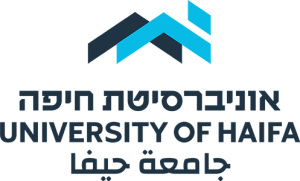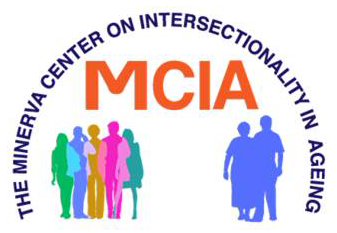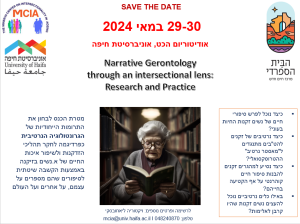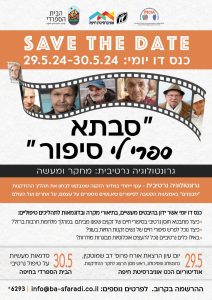CALL FOR RESEARCH PROPOSALS:
Narrative Gerontology through an intersectional lens: Research and Practice
The Minerva Center on Intersectionality in Ageing (MCIA), the University of Haifa in collaboration with the Sephardi House invite you to participate in the first conference in Israel on the topic:
Narrative gerontology through an intersectional lens: research and practice
Narrative Gerontology through an intersectional lens: Research and Practice
May 29-30, 2024
In the last two decades, narrative gerontology has been developing. This is a unique branch of aging science that seeks to examine the aging process “from the inside”, through systematic listening to the stories that older women tell about themselves, others and the world. By focusing on the biographical aspect of aging, narrative gerontology seeks to respect the uniqueness and agency of older women, and illuminate the possibilities of growth and development inherent in old age. At the conference, we will examine the unique contributions of narrative gerontology, both as a paradigm for researching aging processes and as an approach to promoting the quality of life of older women, and this from an intersectional perspective. Researchers are invited to submit proposals on these topics. Examples of questions the conference will address:
– How is narrative resilience expressed in the life stories of old immigrants?
– How can we interpret life stories of old women living in poverty?
– How do LGBT elders’ narratives oppose the heterosexual “master narrative”?
– How will we help old immigrants to understand a coherent life story despite the amputation of their lives?
– With what narrative tools can we empower old women who were victims of violence?
Guidelines for submitting abstracts
Researchers are invited to submit abstracts of empirical studies in the field of narrative gerontology and the description of narrative interventions (“narrative care”) with older people and their families.
The abstract will be between 200 and 300 words and will include: theoretical background, research questions/purpose of the intervention, research method/intervention, findings/intervention process, and conclusions.
A brief biographical description of the presenter must be attached to the proposal (4-5 sentences)
At the top of the abstract, the names of the presenters, academic degree, institutional affiliation, email and phone number must be stated.
The last date for sending abstracts is: until March 20, 2024
To submit abstracts and for questions, contact Victoria Liachovski at mcia@univ.haifa.ac.il
steering committee of the conference:
Representatives of the Minerva Center: Prof. Tova Band-Winterstein, Prof. Zvi Izikovitz, Dr. Gabriela Spector-Merzel, Sapir Academic College
Representative of the Sephardi House: Netali Ben, CEO
Representative of the Faculty of Welfare and Health Sciences: Dr. Ksenia Shulaiev, responsible for cooperation between the University of Haifa and a Sephardi nursing home
Old age and marginalization during times of war
The Minerva Center on Intersectionality in Aging (MCIA) at the University of Haifa, Faculty of Welfare and Health Sciences is inviting researchers including Ph.D. students to submit research proposals for 2024.
The general purpose of the MCIA is to serve as a national and international venue for research, training, education, and dissemination of knowledge in the areas of institutional, cultural, socioeconomic, health and policy aspects of intersectionality in aging.
We aim to initiate and distribute systematic interdisciplinary research on the circumstances, risk and protection factors, intervention or prevention methods relevant to aging persons of marginalized groups, using qualitative, quantitative, and mixed methods. The following research topics are suggested, which are all related to the current war we are experiencing in Israel:
- The impact of leaving home for older adults
- Vulnerability and resilience among older adult population groups
- The impact of environmental violence and aggression on intergenerational relationships
- Risk for different kinds of abuse including financial exploitation
- The impact of war on physical and mental health status of old persons
- Life stories of strength and resilience of old person during the war
- Expressions of wisdom of life during war
- Bridging inter-cultural gaps by cooperation between Jews and Arabs: reconstructing trust
- Artistic expressions of anxiety, fear and insecurity of old persons during the war
- Voluntarism of old persons as expression of participation and competence during the war
- Social support networks involving old persons manifested during the war
- Access to care and health/social services for old persons during war
- Human rights, ageism, and the bio-ethics of old age in times of war
Additional related topics are welcome.
Preference will be given to proposals involving:
- Immigrants and ethnic minorities in late life
- Older adults with diverse sexual orientations
- Older adults with life-long disabilities
- Old persons engaged in violence, abuse and neglect.
The MCIA will fund each proposal for up to 5000 Euro –We expect these funds to be used as seed money for writing larger proposals in the future.
The following expenses may be funded:
- Graduate students (doctoral and master level) scholarships
- Post-doctoral fellowships / visiting researchers (short and longer term)
- Workshops, colloquia and conferences
- Development of empirical databases
- Publications of relevant research products
Guidelines for the submission of proposals: The proposal should be no longer than five pages long (A4; Times New Roman; size 12; Double-space), and should include the following: (1) Aims and rationale, (2) Brief review of existing knowledge, (3) Methodology, including sample description and sampling method, data collection, data analysis, (4) Proposed timeline; and (5) Expected outcomes and their potential scholarly and practical significance (5) Budget description
The research proposals’ winners will be required to present their findings as part of one of the seminars held at the Minerva Center on Intersectionality in Aging (MCIA).
They will also be required to mention the fact that they won a grant from the MCIA in each of their future publications
All applications must be accompanied by curriculum vitae of the applicant(s).
Deadline: March 31st, 2024
The research proposals should be sent to: Prof. Tova Band-Winterstein, PhD, Email: MCIA@univ.haifa.ac.il
Aging with a long-term disability: challenges and opportunities
The journal Gerontology and Geriatrics invites researchers from the field of aging and related fields to send articles to a special issue on “Aging with Long-Term Disabilities: Challenges and Opportunities”. The issue will focus on the elderly living with some kind of long-term disability (for example: mental-developmental, physical).
The life expectancy of people with a long-term disability (PLD) has increased significantly in recent years due to advances in medicine and health and welfare services. Today, the life expectancy among people with PLD is almost equal to the general life expectancy. Along with the increase in life expectancy, the research indicates that the physical aging processes among people with MS are earlier and more accelerated compared to the general society. The premature aging of people with MS leads to a unique situation where there are sometimes two generations of elders in one nuclear family, the parents and the person with MS Q. The aging of people with MS is reflected in four main dimensions: physical aging; social aging; Mental-cognitive aging and functional aging.
The special issue of gerontology and geriatrics, which will be dedicated to aging populations with MS, seeks to shed light on the challenges faced by this marginalized and transparent population and their families and on possible solutions that will provide an adequate response to their needs. Governmental, systemic and organizational in the various frameworks that take care of this population. The issue will focus on the publication of research findings related to the topic.
Proposals can be submitted that deal with issues in the field of challenges and responses to the health, psychological, social, cultural, economic and legal needs of the population of aging people with MS and their families, directly or indirectly related to the world of aging in the broadest sense. Priority will be given to original articles, literature reviews, case studies and articles dealing with in policy.
The articles must be sent by 02.2024 to the address: gerontology.editor@gmail.com according to the instructions for authors that can be found at: http://www.gerontology.org.il/authors/ specifying the topic of the special issue (aging with long-term disabilities) : challenges and opportunities).
German-Israeli Minerva-Gentner Symposia, 2025
“Fifty Ways” to Experience Aging: Insider Perspectives to Advance Research and Practice in Old Age
Research in gerontology and related disciplines has explored multiple dimensions of aging. However, the perspectives of older adults are underrepresented in research, policy and practice; intersectional insights into the experiences of marginalized older persons are particularly limited. As a result, older populations are subjected to neglect, systemic marginalization, and inequality. This symposium asks: How can we—researchers, practitioners, policy makers and students—understand the multiple ways of “being in the world” as an older adult? How can we get closer to the daily lives experienced by older adults themselves and by so doing give them voice? This symposium aims to minimize the gap between understanding the experience of old age by researchers and professionals vis-vis the experience of old age by the old persons themselves.
Specific topics to be addressed during the Symposium
To grasp the experiences of aging, and the many, dynamic dimensions of being an older adult, this symposium will center on three different theoretical and methodological approaches: (1) life-course narratives (2) material and eco-gerontology, and (3) age simulation suits. Focusing in detail on each approach will be followed by discussions of how to leverage these approaches together to reach a more complex and nuanced understanding of the experience of aging.
- Life-course narratives: Narrative gerontology celebrates the stories of older adults about themselves, others, and the world, as a unique way to understand aging from “within” (Bohlmeijer et al., 2011). Older adults reflect on subjective experiences of events throughout their life and the influences these experiences have had on their worldview and identity (Atkinson, 2012). Narratives offer a way to explore how older adults make sense of themselves throughout the process of ageing, to understand the meanings they attribute to the environments and societies in which they live and get closer to their experiences across the life course and those of old age. We will explore questions such as: what holds the most value for older adults? What is in the foreground of their life stories and experiences? How do age and aging fit into the life course, and how do they enmesh and intertwine with other life narratives (What identity configurations do narratives help to reveal, and what do they help us understand about the ways in which older adults perceive themselves experience and manage their particular worlds?
- Material and eco-gerontology: The field of material gerontology calls for a de-centering of the human body in the process of aging, to examine how objects of memory, everyday objects, technologies, and spaces co-constitute daily experiences of old age (e.g., Andrews & Duff, 2019). Eco-gerontology also offers novel ways to approach and understand experiences of age and aging. Living environments are seen as essential factors influencing the feeling of aging and the aging process (e.g., Wahl & Weisman, 2003); the ongoing dialogue between people and these environments offers formative ground upon which to explore the complexities of aging, including dimensions such as well-being and quality of life (Saup, 1993). Through exploring the relations between older adults, the materials and spaces that make up their daily lives, these two approaches offer a lens through which twe gain an intimate understanding of the experience of aging. In this symposium, we will ask: How materials are active subjects in the aging process? How are experiences of aging transformed through the interrelations between older adults, the materials and spaces that make up their everyday lives? What can objects and the environments of living they make up reveal to practitioners and researchers about the experiences of aging?
- Age Simulation Suits (ASS): The application of age simulation suits (ASS) has undergone continuous development in past decades and this body of research has reported conflicting findings. Feeling like an older adult, both emotionally and physically, has the potential to create awareness of the physical and psychological changes and challenges of aging (e.g., Vieweg & Schaefer, 2020). Such an experience can sensitize the attitude toward older adults, as several studies have previously shown (e.g., Mandegari et al., 2021). However, after wearing the ASS, people reported more negative expectations regarding aging, along with an increased susceptibility to age-associated impairments (Gerhardy et al., 2022). Such findings further reiterate the need to consult on whether, how, when and where ASS should be used. How can ASS realistically simulate the ageing experience in its complexity? What are physical and psychological changes during and following the use of ASS? How can ASS be used in research, education and practice?
The purpose of the symposium is to conduct in-depth and comprehensive discussions of each of these topics and to explore the ways in which these approaches can bolster each other in the endeavor to gain insider perspectives into the experience of aging.
We invite researchers to submit research proposals. The proposal will include budget element.
Proposals must be submitted by 10 July 2023.
THE INTERSECTIONALITY IN AGING DURING THE COVID-19 PANDEMIC
We invite researchers to submit research proposals. The proposal will include budget element.
The offer can be submitted in Hebrew, the grant is up to 5000 Euro.
Proposals must be submitted by end of April 2021.
- Immigrants and ethnic minorities in late life
- Older adults with diverse sexual orientations
- Aging and life-long disability
- Life-long engagement in violence, abuse and neglect.
- Older persons with lifelong engagement in crime
We aim to initiate and distribute systematic interdisciplinary research on the circumstances, risk and protection factors, intervention or prevention methods relevant to aging persons of marginalized groups, using qualitative, quantitative, and mixed methods
The Minerva Center for the Study on Intersectionality in Aging (MCIA) at the University of Haifa, Faculty of Welfare and Health Sciences is inviting researchers to submit research proposals for 2022.
The general purpose of the MCIA is to serve as an international venue for the research, training, education, and dissemination of knowledge in the areas of institutional, cultural, socioeconomic, health and policy aspects of intersectionality in aging.
We aim to initiate and distribute systematic interdisciplinary research on the circumstances, risk and protection factors, intervention or prevention methods relevant to aging persons of marginalized groups, using qualitative, quantitative, and mixed methods, with the following populations:
- Immigrants and ethnic minorities in late life
- Older adults with diverse sexual orientations
- Aging and life-long disability
- Life-long engagement in violence, abuse and neglect.
- Older persons with lifelong engagement in crime
Priority will be given to the following topics:
- Sustainability, old age, and the environment
- Aging Families, Aging Singles, Bereavement, Aging Individuals without children, Divorce among ageing coupes
Research proposals should examine these topics from an intersectional and life course perspective
The MCIA will fund each proposal up to 5000 Euro –We expect these funds to be used as seed money for writing larger proposals in the future.
The following expenses may be funded:
- Graduate students (doctoral and master level) scholarships
- Post-doctoral fellowships / visiting researchers (short and longer term)
- Workshops, colloquia and conferences
- Development of empirical databases
- Publications of relevant research products
Guidelines for the submission of proposals: The proposal should be no longer than five pages long (A4; Times New Roman; size 12; Double-space), and should include the following: (1) Aims and rationale, (2) Brief review of existing knowledge, (3)
Methodological remarks including sample and sampling, data collection, data analysis, (4) Proposed timeline; and (5) Expected outcomes and their potential scholarly and practical significance (5) Budget
All applications must be accompanied by curriculum vitae of the applicant(s).
Deadline: March 31st, 2022
Prof. Tova Band-Winterstein, PhD, Email: MCIA@univ.haifa.ac.il
Growing old as LGBT: Between exclusion and inclusionGrowing inclusion
LGBT people in old age are at increased risk of living in multi-faceted exclusion: exclusion based on sexual and gender identity, exclusion based on age and old age
And also internal and intra-community exclusion, when the intersections between these types of exclusion are located in the spectrum of different and unique identities. In this context,
The life experiences of aging LGBT people in Israel move in the tension between oppression and empowerment, while the needs and challenges they face have won
So much for little public and scientific attention.
The purpose of the conference is to reveal the knowledge that exists in the theoretical discourse and the intersectional queer-gerontological research, and to address the gaps in the interface between
The reality of life of aging LGBT populations, the academic research, interventions and policy design.
The conference is intended for relevant multidisciplinary professional and academic audiences from fields such as: sociology, psychology, gerontology, work
Social, gender and LGBT studies, public health, law and art.
We will be happy to receive abstracts of studies or lectures in these fields, which have a connection or launch and at the same time are not necessarily limited
For topics such as:
A socio-historical perspective of the course of life as an LGBT person with an emphasis on the experience of aging
The geopolitical aspect of aging as a LGBT person: between the geographic and/or social periphery and the metropolis
Visibility and recognition in front of living in the closet as an LGBT person in old age
Individual and group intervention among aging LGBT people
Social networks, marriage and relationships in old age
Expressions of ageism, sexism and homophobia in the gay communities and the intersection between them
Sexuality and sexual and gender identity in old age
Economic, legal and occupational aspects of LGBT people in old age
Positioning and social image and socio-political consciousness of aging as LGBT: between neediness and resilience
LGBT medicine and aging: gaps and challenges in the health field
Representations of older LGBT people in media, cinema, theater and art
Initiatives from the field
The abstract will be between 200 and 300 words and will include a theoretical background, purpose or research question, method, findings and discussion. In addition, we will be happy to receive
Proposals to present diverse artistic works and initiatives from the field related to the theme of the conference. These proposals will include a detailed description of the work,
The context in which it was held and its expected contribution to the conference.
In addition to the proposals, a short biography of 4-5 sentences must be sent
The last date for sending the abstract is: July 30, 2022
Nature and the Environment in Old Age: Challenges and Opportunities in the Era of Sustainability
The aging process is related to changes in physical, mental and social health and alongside the increase in life expectancy, old age adults face many challenges, such as functional disabilities, deterioration of vision and hearing and decreased mobility.
The environment has a great influence on the health and well-being of older adults, so spending time in green areas encourages a decrease in stress, anxiety and depression and may improve mood. At the same time, many of the natural sites and open spaces are not accessible to old adults and the proportion of adults visiting open spaces is significantly lower than their proportion in the population. Beyond that, research in the field regarding the experience of use, opportunities and challenges associated with exposure to open spaces is limited.
The conference works to promote one of the prominent goals of the United Nations Sustainable Development (SDG): “Reducing Inequality” (Goal 10) and the goal of the organizers is to work to reduce the inequality of the older population, in terms of accessibility to natural resources and the environment, and to promote equal opportunities and planning for all. This activity will be done by ensuring equal opportunities, by promoting legislation, policies and adequate actions on the subject.
The purpose of the conference is to reveal and develop the knowledge that exists in the theoretical and research discourse, and to raise practical and theoretical ideas while experimenting with suits that simulate old age and the research done with them.
The conference is intended for relevant multidisciplinary professional and academic audiences from fields such as: environmental studies, gerontology, tourism, sociology, psychology, social work, public health, law and more.
We will be happy to receive abstracts of studies or lectures in these areas, which have a connection or launch and at the same time are not necessarily limited to topics such as:
Use of suits simulating an old woman in studies
The interrelationship between old age and the environment and the sustainability of the experience of visiting nature sites by the elderly
Accessibility of nature sites and hiking trails
Walkability in an urban and natural environment
“Planning for all” on Teva sites
Social and economic aspects of vacation tourism and leisure in old age
Intergenerational relations and family trips
The effect of the corona virus on going out into the nature of the older population
Preparation of local authorities for old age
Walking based apps for the elderly
Exclusion of elders from the space
Adult wellbeing and nature
Senior tourism
The abstract will be between 200 and 300 words and will include theoretical background, purpose or research question, research method, findings and discussion.
In addition, we will be happy to receive proposals for the presentation of diverse artistic works related to the theme of the conference. These proposals will include a detailed description of the work, the context in which it was conducted and its expected contribution to the conference. In addition to the proposals, a short biography (4-5 sentences) must be sent.
The last date for sending the abstract is: July 30, 2022




